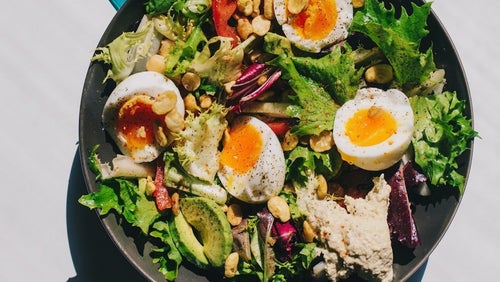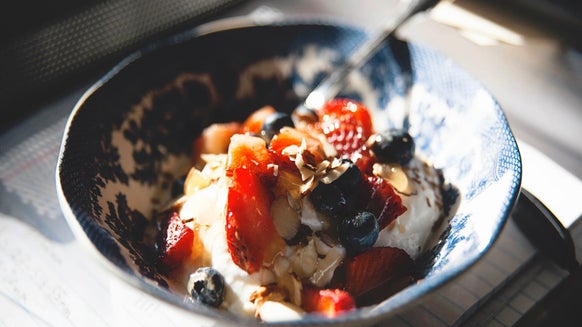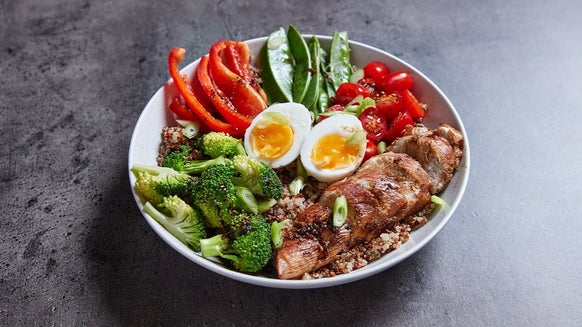
If you've recently fought a cold, you've probably heard someone suggest stocking up on vitamin C. This nutrient is well known for its immune-boosting properties, but there's much more to it than just that.
This guide will walk you through everything you need to know about vitamin C, helping you understand its benefits and how you can get more of it to feel your best every day.
Jump to:
- What is Vitamin C and What Does it Do?
- Key Benefits of Vitamin C
- How Much Vitamin C Do I Need Every Day?
- Signs of Vitamin C Deficiency
- Where to Get Vitamin C
What is Vitamin C and What Does it Do?
Also known as ascorbic acid, vitamin C is an essential nutrient that your body needs to function correctly. It is a powerful antioxidant that helps protect your cells from damage.
The body cannot produce or store vitamin C on its own, which means you need to get it from your diet every day.
So, what does vitamin C do for your body? It supports various vital functions, from immunity to energy levels.
Immune System Support: Vitamin C contributes to the normal function of your immune system. It helps to keep you feeling your best every day. Reduces Tiredness: It can help to reduce tiredness and fatigue. This makes it an ideal nutrient for those with an active or busy lifestyle. Antioxidant Protection: Vitamin C protects your cells from oxidative stress. This stress can be caused by free radicals in the body. Collagen Formation: It contributes to normal collagen formation. This is vital for the proper function of blood vessels, bones, cartilage, gums, skin, and teeth.1
Vitamin C Benefits
The benefits of vitamin C extend far beyond just supporting your immune system. It plays a crucial role in overall health and wellness. Here’s a closer look at some of the key benefits.
Vitamin C for Immune Health
One of the best-known benefits of vitamin C is its role in supporting the immune system. It helps to keep your natural defenses strong. Vitamin C also contributes to the maintenance of normal immune function during and after intense physical exercise. This makes it a popular choice for athletes and fitness enthusiasts.
Vitamin C for Energy and Fatigue
Feeling tired or drained? Vitamin C can help. It contributes to the reduction of tiredness and fatigue, giving you a much-needed energy boost. This is particularly beneficial for those with demanding work schedules or intense training routines.

Top 10 Supplements For Energy To Fight Tiredness
Nutritionist recommends the best supps to give you a boost....
Vitamin C for Skin Health
Looking for a natural glow? Vitamin C is a vital nutrient for healthy, radiant skin. It contributes to normal collagen formation for the normal function of skin, helping to maintain its structure.
Vitamin C and Iron Absorption
Did you know that vitamin C can also help your body absorb other nutrients? It increases iron absorption, which is especially important for those on a vegetarian or vegan diet. Iron is essential for energy production and red blood cell formation.
How Much Vitamin C Do I Need?
The NHS recommends adults get 40mg of vitamin C per day. This is about as much as you'd get from a small orange or half a red pepper.
The best way to ensure you are getting enough is to eat a balanced diet rich in fruits and vegetables. If you struggle to get enough from your diet, a vitamin C supplement could be a great option.
Am I Deficient in Vitamin C?
While severe vitamin C deficiency is rare in developed countries, it is still possible to have low levels. Early symptoms can be subtle and might include:
- Dry and damaged skin
- Fatigue and low energy
- Slow-healing wounds
- Swollen and bleeding gums
Easy bruising1
If you suspect you might be deficient, it is always a good idea to speak with a healthcare professional. They can provide a proper diagnosis and guidance.
Where to Get Vitamin C
The best way to get your daily dose of vitamin C is through your diet. Many delicious and readily available foods are packed with this essential nutrient.
Foods rich in vitamin C include:
Citrus fruits: Oranges, grapefruits, lemons. Berries: Strawberries, blueberries, raspberries. Cruciferous vegetables: Broccoli, Brussels sprouts, kale. Other fruits: Kiwis, mangoes, papayas. Peppers: Bell peppers (especially red).
Including a variety of these foods in your daily meals can help ensure you are getting a steady supply of vitamin C.
Take Home Message
Vitamin C is a powerful and essential nutrient that plays a crucial role in maintaining your overall health and well-being. From supporting your immune system and reducing fatigue to promoting healthy skin and aiding in iron absorption, the benefits of vitamin C are vast.
Whether you get it from a balanced diet or a high-quality supplement, making sure you get enough vitamin C every day is a simple step towards a healthier you.
READ THESE NEXT:

Tips to Boost Your Vitamin D Levels This Fall & Winter
Follow these tips to get your vitamin D levels up this winter....

10 Foods High In Vitamin B12

Claire is a Registered Dietitian through the Academy of Nutrition and Dietetics and a board-certified Health and Wellness Coach through the International Consortium for Health and Wellness Coaching. She has a Bachelor of Science in Biology and a Master’s degree in Clinical Dietetics and Nutrition from the University of Pittsburgh.
Talking and writing about food and fitness is at the heart of Claire’s ethos as she loves to use her experience to help others meet their health and wellness goals.
Claire is also a certified indoor cycling instructor and loves the mental and physical boost she gets from regular runs and yoga classes. When she’s not keeping fit herself, she’s cheering on her hometown’s sports teams in Pittsburgh, or cooking for her family in the kitchen.
Find out more about Claire’s experience here.
1. National Institutes of Health (Office of Dietary Supplements). Vitamin C: Health Professionals Fact Sheet, 2020. Accessed March 12, 2020.







